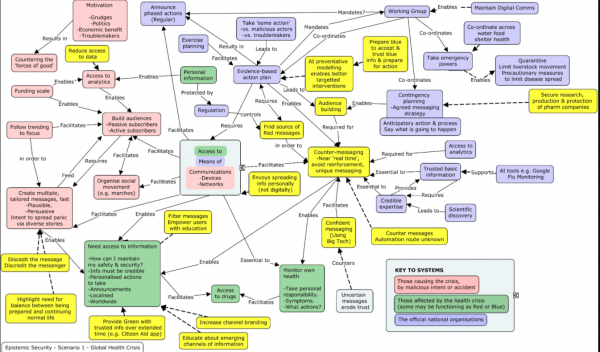Paper by Elizabether Seger and Mark Briers: “The current COVID-19 pandemic and the accompanying ‘infodemic’ clearly illustrate that access to reliable information is crucial to coordinating a timely crisis response in democratic societies. Inaccurate information and the muzzling of important information sources have degraded trust in health authorities and slowed public response to the crisis. Misinformation about ineffective cures, the origins and malicious spread of COVID-19, unverified treatment discoveries, and the efficacy of face coverings have increased the difficulty of coordinating a unified public response during the crisis.
In a recent report, researchers at the Cambridge Centre for the Study of Existential Risk (CSER) in collaboration with The Alan Turing Institute and the Defence Science and Technology Laboratory (Dstl) workshopped an array of hypothetical crisis scenarios to investigate social and technological factors that interfere with well-informed decision-making and timely collective action in democratic societies.
Crisis scenarios
Crisis scenarios are useful tools for appraising threats and vulnerabilities to systems of information production, dissemination, and evaluation. Factors influencing how robust a society is to such threats and vulnerabilities are not always obvious when life is relatively tranquil but are often highlighted under the stress of a crisis.
CSER and Dstl workshop organisers, together with workshop participants (a diverse group of professionals interested in topics related to [mis/dis]information, information technology, and crisis response), co-developed and explored six hypothetical crisis scenarios and complex challenges:
- Global health crisis
- Character assassination
- State fake news campaign
- Economic collapse
- Xenophobic ethnic cleansing
- Epistemic babble, where the ability for the general population to tell the difference between truth and fiction (presented as truth) is lost
We analysed each scenario to identify various interest groups and actors, to pinpoint vulnerabilities in systems of information production and exchange, and to visualise how the system might be interfered with. We also considered interventions that could help bolster the society against threats to informed decision-making.
The systems map below is an example from workshop scenario 1: Global health crisis. The map shows how adversarial actors (red) and groups working to mitigate the crisis (blue) interact, impact each other’s actions, and influence the general public and other interest groups (green) such as those affected by the health crisis.
Systems maps help visualise vulnerabilities in both red and blue actor systems, which, in turn, helps identify areas where intervention (yellow) is possible to help mitigate the crisis….(More)“

